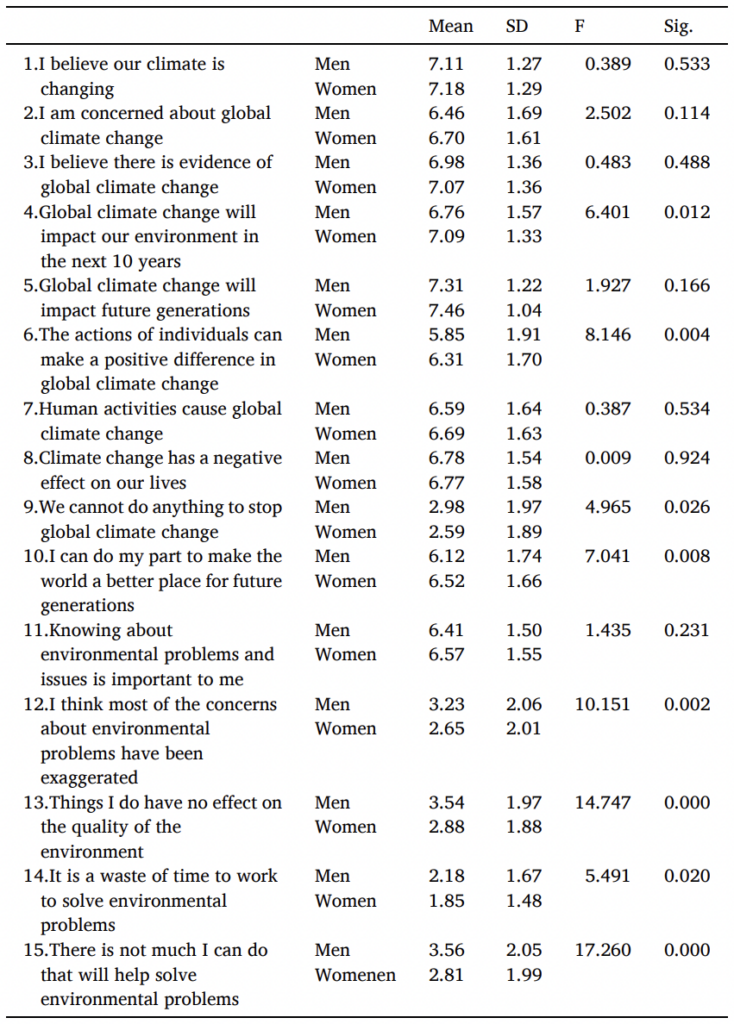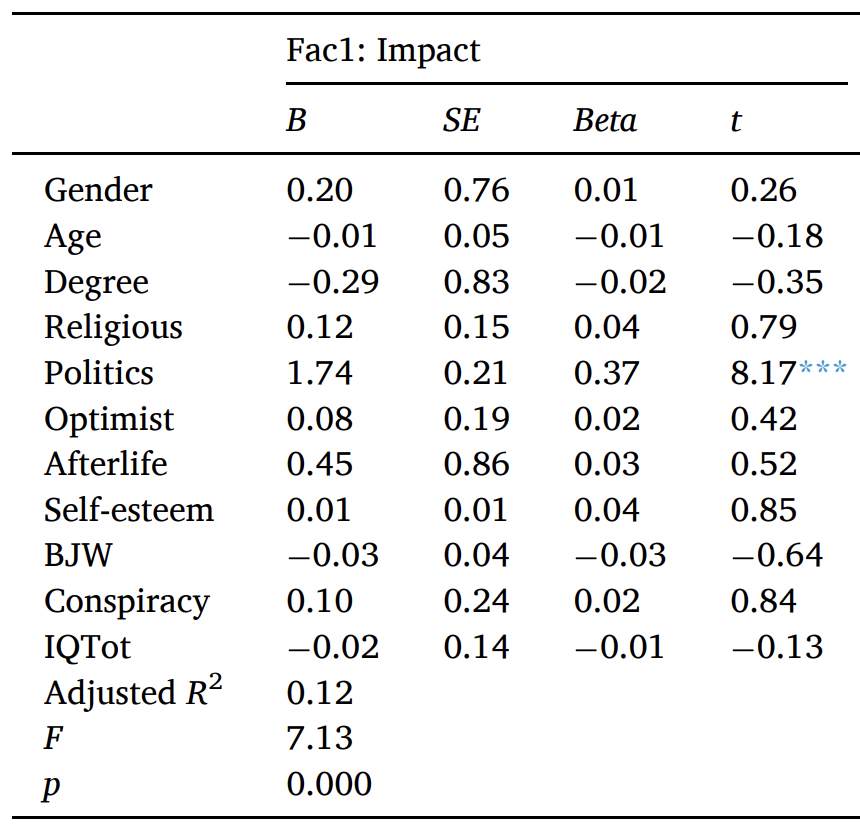Based on how the issue is often framed in the media, you might assume that people of higher intelligence would be more likely to take the ‘alarmist’ position in climate change: that climate change is a serious problem and it’s caused mostly by human activity.
After all, it is said that there’s an overwhelming scientific consensus supporting the ‘alarmist’ position. And you’d expect that people of higher intelligence would be more likely to share the views of scientists.
However, that’s not what a recent study found.
Two psychologists – Adrian Furnam and Charlotte Robinson – gave the ‘Climate Change Attitude Survey’ to a sample of 500 European adults, selected through the platform Prolific. This is a 15-item questionnaire, measuring people’s beliefs about climate change:

As you can see, some of the items (e.g., 1, 2 and 3) deal with whether climate change is happening, while other items (e.g., 10, 11, 12) deal with whether individual actions can make a difference.
In order to disentangle these two aspects of the survey, the researchers factor-analysed respondents’ answers. They identified a factor that was strongly associated with the answers to items 1–7 and 8. Which is fancy way of saying they created a variable that gave substantial weight to these items.
Note that the items all deal with whether climate change is happening, whether it’s a serious problem, and whether it’s caused by human activity. Hence the corresponding variable can be seen as an overall measure of agreement with the ‘alarmist’ position on climate change.
Aside from the ‘Climate Change Attitude Survey’, respondents were given an intelligence test, and were asked about their religious and political views. The intelligence test was a 16-item version of the ‘Wonderlic Personnel Test’ – a well-known and respected instrument.
So what did the researchers find? Overall, there was no correlation between intelligence and attitudes to climate change climate change. People with higher intelligence were neither more nor less likely to take the ‘alarmist’ position.
On the other hand, political views were strongly associated with people’s attitudes: those who identified as “liberal” were much more likely to take the ‘alarmist’ position than those who identified as “conservative”.
When the researchers carried out a multivariate analysis of people’s attitudes (by including many different predictors in the same model) they found that political views was the only statistically significant predictor. This is shown in the table below:

Overall, Furnham and Robinson found no evidence that people of higher intelligence were likely to take the ‘alarmist’ position on climate change – a result they described as “surprising”. Contrary to what many would have us believe, climate change ‘sceptics’ are not deficient in cognitive ability.











To join in with the discussion please make a donation to The Daily Sceptic.
Profanity and abuse will be removed and may lead to a permanent ban.
Then it does surprise me that the Conservatives get even a single vote in any election. You would have to have the IQ of a snail to believe that the Tories represent their voters attitudes on this or any other position (immigration, transgender nonsense, economics etc.).
You’re forgetting though that these are NOT Tories. If they were they would likely still have that 80-seat majority
It is harder to pull the wool over the eyes of more intelligent people.
Most people with a decent education understand that real science has never been conducted by consensus, and that many scientific breakthroughs have been made by people who think laterally and challenge any consensus.
However, the data presented in this study does not support the hypothesis that “it is harder to pull the wool over the eyes of more intelligent people”. It suggests that it is harder, at least regarding Climate Change, to pull the wool over those who identify as “liberal”. Perhaps it all depends on your definition of wool-pulling. I suspect the same is true over Covid.
‘More’ intelligent people are more easily swayed by what other ‘more’ intelligent’ people say, otherwise they would feel they were dumber, not understanding what Professor Clever-clogs is saying.
‘More’ intelligent people are the easiest to scam because they believe they are far too intelligent to be caught out.
Intelligent does not mean smart.
“Climate change” is nothing more than a seriously insidious cover for depopulation, enslavement and control. The C1984 was the trial run and with its relative success now the real destruction can be unleashed. The initial target date for first stage completion is 2030.
Anything referencing ‘climate change’ can be safely written off as gaslighting, BS and downright lies.
I don’t think political leaning, as presented in the study, is the real key. It sounds like this must be a US study, based on its use of the words ‘liberal’ and ‘conservative’.
In Europe the more apt common description would be social democrat vs any political grouping that does not believe the state to be an almighty god-like being, usually referred to as ‘right-wing’; the less they bend the knee to the state, the greater the qualification as ‘extreme/far right’.
As many people have pointed out over the last few years, politics is no longer a matter of left vs right.
I’d say the real division is between people who like to take control of their own lives and only have such government and legislation as are necessary to establish order in complex societies vs people who want to switch their brain off, abdicate all responsibility for their lives and let ‘government’, as if it were a living entity with no human input, take control, as it is always right, beneficent and never to be questioned. These people are the “you can fool some of the people all of the time” component of that famous phrase – and that is who governments and the behind-the-scene string pullers (to quote another DS article: those who buy politicians) target. When they are told to be alarmed, they obey and are alarmed.
Very good. Sadly there’s a third category in the division – people who manoeuvre themselves into positions of power and influence who are happy to exploit sheeple’s desire to herded. They have had a field day during covid.
Given that climate policies and the propaganda relating to them have a larger agenda of Social Justice, Equality, and Sustainable Development it would be wrong to say that political leanings plays no role in peoples opinion on this issue.
Well said.
I agree the real division is between those who exclusively use their left cerebral hemisphere, and those who also engage their right cerebral hemisphere to add context and nuance.
I would posit that this is a true measure of intelligence.
Social democrat is the acceptable face of Fascism, itself an evolution of Socialism, the Political Continuum of Fascistic States, Nazi Germany, Mussolini’s Italy, Vichy France which just happened to supply the political heirs of those three places to be the founders of the EEC/EU. And Germany is the cradle of Big Green going back before the Industrial Revolution, and of which Adolph-H et al were big fans. Plus ça change.
Liberal’ is what Fascism is called in the US, because Social democrat would cause confusion with respect to the Democrat Party which doesn’t want to be thought of as Socialist.
My own survey results.
1-The lower your intelligence the more fervently you believe in Climate Change/Eco Fascism.
2-The lower your IQ the more you embraced the Rona Fascism.
3-The lower your intellect the more likely you are to be a member of both the Rona and Climate Change Religions.
4-The more idiotic, gullible, misinformed, and obeisant you are, the easier is it for you to travel seamlessly and with little difficulty, between the Rona and Climate churches.
5-The more bereft you are of real science, real maths, morality, real faith, virtue, a real life and a balanced perspective, the more religious you are about the Church of Climate Change.
There you go. Science say.
These results are encouraging despite an unfair advantage already existing in the system – the higher a likelihood the academic agrees with the alarmist (bows to the pressure) since that’s where the green lobby is concentrating their efforts and where the funding is going. I hate to say it but can some scientists even be trusted they’re telling the truth? It’s the echo chamber that has presented itself as the most respected (if you agree with certain perspectives) yet beyond reproach and further scrutiny (failed by default if your only answer is “trust us”).
Despite the monotonous implication in its use in propaganda, the “experts” & “scientists” don’t know everything regardless of their claiming the science is settled. The sceptic has a clear advantage they’re not forgetting, to question is a pivotal component of the scientific method. Shouldn’t we ALL be sceptical?
The science is settled – surely that in itself should have set off alarm bells for anyone who does believe in science?
My skills are in no way to be found in any of the exact sciences, anything particularly technical goes over my head. But I do know that true science is never settled, that it always requires questioning and debate and revisiting things that might have been deemed established but with progress may no longer be.
The only science that does seemed to be settled is the rule of political science that if you give a political shyster an inch, they’ll always take ten miles (yes, just made this up on the spot )
)
I am surprised TBH. My experience of covid suggests “intelligent” people are on average more gullible and more trusting of “experts”. I guess it depends how you define intelligence.
I think that is true of the educated and only of the intelligent insofar as education is correlates with intelligence (and only because the education system selects so strongly in that way).
I think a safe prediction is that the least gullible are the intelligent but not highly educated.
Probably. I think there are also people who are a bit thick outwardly (not all that articulate, maybe poor at maths) who have a great instinct for when they are being sold a line of bullshit.
Oh yes. I know plenty of people with little by way of formal education, but very sharp, highly intelligent and able to sniff out BS a mile off.
Just as I know plenty of people with a Master’s and I wouldn’t trust them to be able to pick up after my dog.
Perhaps the most gullible are the humanities graduates?
I would agree with you, but I think the key motivator is distain, that only people above a certain level of intellectual and moral superiority can understand the full implications of the discussion, like parents listening to their children before correcting them and putting them right..
Also seen in Remainers.
Don’t confuse intelligent with smart.
Self-proclaimed intelligent people believe they are too clever to be wrong and that other intelligent people are too clever to be wrong – hence all the appeals to authority… Scientists/Experts say; you are not a doctor/scientist/expert so nothing you say counts – shut up.
So anyone who disputes what the clever, credentialled people say, must be dumb, therefore I, Mr Intelligent Person, must reject any dissent otherwise that would mean I’m dumb too.
This is correct surely. “Climate change” is a political construct. More rational people tend to be towards the right.
Until recently, unless you were actually a climate scientist studying climate change attribution, or took a big chunk of time to research the issues, it wasn’t obvious which camp was correct, so for almost everybody however intelligent, their views to the extent that they have views were influenced by the narratives they happened to be exposed to in their social/political bubble.
I do think things have changed a bit recently, there are things that ought to be clues for the situationally aware that we’re being hoaxed, even without a deep understanding of climate change attribution:
This really is the corona playbook being used again – it worked splendidly for corona after all.
– Cost-benefit analysis re lockdowns – where they exist (and they do in some countries at least), they have been ignored.
– Pandemic, emergency – based on China’s lies and fake videos and overreactions of Italy and Spain. Otherwise, most of us would not have known there was anything going on. Indeed, we now know it was circulating from at least November 2019, maybe earlier, goodness knows how many millions of people already had a dose before it became the scariest lurgy ever.
– Giving us daily updates on death counts and infections, not dissimilar from 28 degrees C all of a sudden being deemed 10 times hotter than Hades.
– The vaxx was the one and only solution, just as zero carbon is now the one and only solution.
Just as with the corona scam, unfortunately, people are going to get screwed 50 ways from Sunday and suffer significant loss before they realise they are being scammed with the climate nonsense.
Scammers are going to scam, it is up to us to wake up and stop letting them, not expect them to stop scamming.
Whilst I agree with much of this, it has been as plain as a pikestaff since 2009 Climategate, what was going on.
In fact, alarm bells were going off long before that with Michael Mann’s Hockey Stick and Al Gore’s “Inconvenient Truth”.
The lies have always come thick and fast (from the “experts” handpicked by HMG) and anyone with reasonable scientific training should have noticed their bullshit meter going wild.
But you don’t need a PhD to realise that something is amiss when you are being asked to ignore the evidence of your own lying eyes, because the Emperor’s New Clothes are actually the height of fashion and good taste.
Exactly so. “Scientific consensus” is a classic oxymoron.
‘Until recently, unless you were actually a climate scientist studying climate change attribution, or took a big chunk of time to research the issues…’
No not really. All you had to do was know how to look at graphs.
That’s a neat and interesting piece of research. It’s not unlike the research published in August 2021 which found that the educational group who were most “vaccine hesitant” were people with PhDs.
But, oddly, the least “vaccine hesitant” were people with a masters or bachelor’s degree.
The next most hesitant group were people with the least education, though they were also more likely to be persuaded to change their minds:
“So not only are the most educated people most sceptical of taking the Covid vaccine, they are also the least likely the change their minds about it…”
https://unherd.com/thepost/the-most-vaccine-hesitant-education-group-of-all-phds/
Far too much store is placed in IQ as an indicator of people’s behaviour and abilities. It is not the intelligence you have, but what you do with it and what sort of person you are.
Climate alarmists are evil misanthropists. Evil requires no great intelligence.